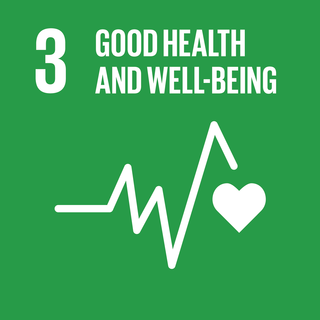Related Research Articles

The Millennium Development Goals (MDGs) were eight international development goals for the year 2015 that had been established following the Millennium Summit of the United Nations in 2000, following the adoption of the United Nations Millennium Declaration. These were based on the OECD DAC International Development Goals agreed by Development Ministers in the "Shaping the 21st Century Strategy". The Sustainable Development Goals (SDGs) succeeded the MDGs in 2016.
The Millennium Project was an initiative that focused on detailing the organizational means, operational priorities, and financing structures necessary to achieve the Millennium Development Goals or (MDGs). The goals are aimed at the reduction of poverty, hunger, disease, illiteracy, environmental degradation, and discrimination against women. At the United Nations Millennium Summit in September 2000 world leaders had initiated the development of the MDGs and had set a completion date for the project of June 2005.

Global health is the health of the populations in the worldwide context; it has been defined as "the area of study, research and practice that places a priority on improving health and achieving equity in health for all people worldwide". Problems that transcend national borders or have a global political and economic impact are often emphasized. Thus, global health is about worldwide health improvement, reduction of disparities, and protection against global threats that disregard national borders. Global health is not to be confused with international health, which is defined as the branch of public health focusing on developing nations and foreign aid efforts by industrialized countries. Global health can be measured as a function of various global diseases and their prevalence in the world and threat to decrease life expectancy in the present day. Estimates suggest that in a pre-modern, poor world, life expectancy was around 30 years in all regions of the world.

Eradication is the reduction of an infectious disease's prevalence in the global host population to zero.

World Malaria Day (WMD) is an international observance commemorated every year on 25 April and recognizes global efforts to control malaria. Globally, 3.3 billion people in 106 countries are at risk of malaria. In 2012, malaria caused an estimated 627,000 deaths, mostly among African children. Asia, Latin America, and to a lesser extent the Middle East and parts of Europe are also affected.
The World Health Organization's global plan of action for workers' health delineates common principles by which workplaces should abide by, including the ability for workers to enjoy the highest attainable standard of physical and mental health and favorable working conditions, as well as the prioritization of the prevention of occupational health hazards. The plan was endorsed by the Sixtieth World Health Assembly on May 23, 2007 because of several concerns. First, workers represent a significant contribution to the world's economic and social development. Furthermore, an international disparity between countries of occupational hazard prevention and access to occupational health services was observed. As such, the plan is grounded on both humanitarian and economically practical grounds.

The quality of health in Cambodia is rising along with its growing economy. The public health care system has a high priority from the Cambodian government and with international help and assistance, Cambodia has seen some major and continuous improvements in the health profile of its population since the 1980s, with a steadily rising life expectancy.
World Pneumonia Day provides an annual forum for the world in the fight against pneumonia. More than 100 organizations representing the interests of children joined forces as the Global Coalition against Child Pneumonia to hold the first World Pneumonia Day on 12 November 2009. Save The Children artist ambassadors Gwyneth Paltrow and Hugh Laurie, Charles MacCormack of Save The Children, Orin Levine of PneumoADIP, Lance Laifer of Hedge Funds vs. Malaria & Pneumonia, the Global Health Council, the GAVI Alliance, and the Sabin Vaccine Institute joined together in a call to action asking people to participate in World Pneumonia Day on 2 November.
The 2010 maternal mortality rate per 100,000 births for Tanzania was 790. This is compared with 449 in 2008 and 610.2 in 1990. The UN Child Mortality Report 2011 reports a decrease in under-five mortality from 155 per 1,000 live births in 1990 to 76 per 1,000 live births in 2010, and in neonatal mortality from 40 per 1,000 live births to 26 per 1,000 live births. The aim of the report The State of the World's Midwifery is to highlight ways in which the Millennium Development Goals can be achieved, particularly Goal 4 – Reduce child
The Broadband Commission for Sustainable Development was established in May 2010 as a joint initiative by the International Telecommunication Union (ITU) and the United Nations Educational, Scientific and Cultural Organization (UNESCO) to promote Internet access, in particular, broadband networks in order to help achieve United Nations development goals, such as the Millennium Development Goals. The Commission was renamed the Broadband Commission for Sustainable Development, following the adoption of the UN's Sustainable Development Goals in September 2015.
The Johns Hopkins Center for Communication Programs (CCP) was founded over 30 years ago by Phyllis Tilson Piotrow as a part the Johns Hopkins Bloomberg School of Public Health's department of Health, Behavior, and Society and is located in Baltimore, Maryland, United States.
The Amazon Malaria Initiative (AMI) is a regional program that was created in 2001 by several countries sharing the Amazon basin with technical support from PAHO/WHO and financial support from the U.S. Agency for International Development (USAID), and managed by USAID/Peru as part of its South American Regional Infectious Disease Program (SARI). The initiative uses a multi-pronged approach to achieve the overall aims of preventing and controlling malaria and reducing malaria-related morbidity and mortality in countries of the Americas. AMI priorities for malaria prevention are as follows, diagnosis and treatment, drug resistance and epidemiological surveillance, vector control, pharmaceutical management, quality of medicines, communication and networking.
Both maternal and child health are interdependent and substantially contributing to high burden of mortality worldwide. Every year, 289 000 women die due to complications in pregnancy and childbirth, and 6.6 million children below 5 years of age die of complications in the newborn period and of common childhood diseases. Sub-Saharan Africa (SSA), which includes Tanzania, contribute higher proportion of maternal and child mortality. Due to considerable proportion of mortality being attributed by maternal and child health, the United Nations together with other international agencies incorporated the two into Millennium Development Goals (MDGs) 4 and 5. In this regard, Tanzania through the Ministry of Health and Social Welfare (MoHSW) adopted different strategies and efforts to promote safe motherhood and improve child survival. Similarly, in an effort to improve maternal and child health, Tanzania's government has declared maternal and child health services to be exempt from user fees in government facilities.
Dalberg Global Development Advisors is a strategy and policy advisory firm. Founded in 2001, the company specializes in global development. Dalberg has worked in over 90 countries with over 400 clients including governments, foundations, international agencies, non-governmental organizations, and Fortune 500 companies. Its mission is to raise living standards in developing countries and mobilize effective responses to the world's most pressing issues.
The President's Malaria Initiative (PMI) is a U.S. Government initiative to control and eliminate malaria, one of the leading global causes of premature death and disability. The initiative was originally launched by U.S. president George W. Bush in 2005, and has been continued by each successive U.S. president.
The United Nations Interagency Task Force on the Prevention and Control of Non-communicable Diseases (UNIATF), hereafter referred to as the Task Force, was established by the United Nations Secretary-General in 2013. Non-communicable diseases (NCDs), also known as chronic diseases, include cardiovascular diseases, cancers, chronic respiratory diseases and diabetes. The role of the Task Force is to bring relevant actors from across the United Nations (UN) system and national governments together to develop whole-of-government, whole-of-society approaches for the prevention and control of NCDs. Following the establishment of the 2030 Agenda for Sustainable Development in 2015, the Task Force's scope of work was expanded to include “NCD related Sustainable Development Goals (SDGs)” such as addressing mental health conditions, violence, injuries, nutrition and environmental issues that contribute to the global burden of NCDs. The Task Force promotes multisectoral action for the prevention and control of NCDs, supports countries to achieve the Sustainable Development Goals (SDGs) and supports countries to move towards Universal Health Coverage (UHC). The work of the Task Force includes implementing the Global Joint Programme to conduct investment cases, coordinating interagency joint programmes and facilitating thematic working groups. The World Health Organization acts as a Secretariat for the Task Force.
Child Mortality in Ghana describes the child mortality in the country of Ghana. Like in other parts of the world, child mortality is declining in Ghana.
Dr. Winnie Mpanju-Shumbusho is a Tanzanian-born paediatrician and public health leader who until December 31, 2015 served as World Health Organization (WHO) Assistant Director General for HIV/AIDS, Tuberculosis, Malaria and Neglected Tropical Diseases based in Geneva, Switzerland. From 2016 to 2019, she served as Board Chair of RBM Partnership To End Malaria. Before joining WHO in 1999, Mpanju-Shumbusho was Director General of The East, Central and Southern African Health Community (ECSA-HC) formerly known as the Commonwealth Regional Health Community for East, Central and Southern Africa (CRHC-ECSA). Mpanju-Shumbusho is a co-founder, board member, and volunteer for the not-for-profit organization Adventures in Health, Education, and Agricultural Development, which was founded in 1981 to provide hands-on, people-to-people assistance to underserved communities in Africa and inner-city United States. She was also co-founder of the Medical Women Association of Tanzania and served as Treasurer and Executive Committee member of the Medical Association of Tanzania. In 2019, she was awarded the Multisector Partnership Honour by Malaria No More as one of the top Women Leading the Fight Against Malaria. Mpanju-Shumbusho is married with two adult children.

Sustainable Development Goal 3, regarding "Good Health and Well-being", is one of the 17 Sustainable Development Goals established by the United Nations in 2015. The official wording is: "To ensure healthy lives and promote well-being for all at all ages." The targets of SDG 3 cover and focus on various aspects of healthy life and healthy lifestyle. Progress towards the targets is measured using twenty-one indicators.

Sustainable Development Goals and Lebanon explains major contributions launched in Lebanon towards the advancement of the Sustainable Development Goals SDGs and the 2030 agenda. Multi-stakeholder forums were held by different UN agencies including the UN Global Compact Network in Lebanon during the late 2010s for the advancement of Global Goals and their Impact on Businesses in Lebanon. The latest two were held on October 18, 2018 and October 2019 under the title of connecting the global goals to Local Businesses.
References
- ↑ Global Malaria Action Plan Archived 2010-04-11 at the Wayback Machine
- ↑ "2008 MDG Malaria Summit: World Leaders Unite - Summary Report" (PDF). 2008. Archived from the original (PDF) on July 18, 2011.
Dr. Coll-Seck, Executive Director of the Roll Back Malaria Partnership, opened the Summit by formally launching the Global Malaria Action Plan (GMAP)
- ↑ "2008 Millennium Development Goals Malaria Summit - Kaiser Network webcast of the event". Henry J. Kaiser Family Foundation. September 25, 2008. Archived from the original on April 10, 2010.
- ↑ "Key Facts, Figures and Strategies: Global Malaria Action Plan, p. 4" (PDF). Archived from the original (PDF) on 2010-03-07. Retrieved 2010-03-26.
- ↑ Secretary-General Ban Ki-moon addresses a high-level interactive panel to launch the Global Malaria Action Plan
- ↑ RBM Country Roadmaps